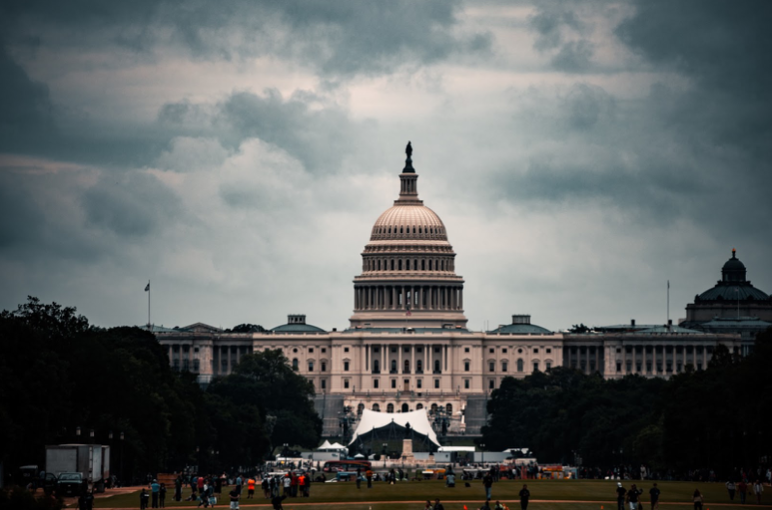Opinion: The Fragility of American Democracy: How We Got Here and How the Coming Years Could Be a Turning Point
November 16, 2021
The United States is the oldest modern democracy and has been conducting elections and maintaining checks and balances since the late 1700s. Many Americans take their freedoms and right to vote for granted, even during a dangerous time for our democracy. Here is how the next few years could impact American democracy for good or bad.
The United States has prided itself on being the world’s oldest modern democracy, protecting its citizens’ liberties, defending democracy around the world, exterminating evil threats such as the Nazi regime, and most importantly, its internal stability. However, a new threat to America’s way of life has become more apparent in recent years. This threat from within is called the Republican Party. The Republicans have not always been an alt-right authoritarian party. Before the Trump era, it was a fiscally conservative party with “family values” and advocated for the protection of liberty. Nevertheless, many Americans have one big question on their minds: What led to where we are now, and what could our country look like in the future?
In 2015, a new kind of candidate, a political outsider, announced that he was running for president. His name was Donald Trump, a New York business tycoon with gold-plated toilets and shiny buildings. He suggested that he “run our country like a business” and “drain the swamp.” These slogans appealed to working-class voters, as stated in an article written by The New Yorker in August of 2015. Mr. Trump was unpopular amongst Americans from the start, but his populist message eventually beat all of the “traditional” Republicans, such as Ted Cruz and Jeb Bush. On November 9, 2016, Trump won the presidential election against Hillary Clinton, and no one had anticipated the damage this man would do to American democracy. Over the next four years, the president established his dominance in the party through intimidation and demagoguery. He would use social media and his charisma to end careers and humiliate people. In addition, networks such as Fox News were pushing out pro-Trump propaganda, portraying him as a strong leader and a man of the people. These methods worked for Mr. Trump. Even though he had lost the election in 2020, he gained support from the American public, shown by CNN’s 2020 election map, where over 74 million people cast their ballots in support of him. In addition, according to the New York Times, a pro-Trump cult called QAnon picked up steam in 2020 during the coronavirus lockdown, which falsely claimed that Trump was fighting a democratic crime ring, including Hillary Clinton and Joe Biden. By the time November of 2021 rolled around, Trump held a god-like status for a large portion of the American public. The notion was that there was no room to criticize the president, and there was not a bigger, more patriotic alpha male anywhere else in the country, as stated by The Washington Post.
The 2020 election was between incumbent Donald Trump and Democratic challenger, then former Vice President Joe Biden. This election lasted for four days. At the beginning of the election, Trump had a big lead in the swing states. Republican distrust in mail-in ballots caused this early lead for Trump. Electronic in-person votes were counted first, showing many Republican leads. The initial republican lead is called a red mirage, and Trump used it to declare an early victory before all of the mail-in ballots were counted. The red mirage is still being used for stolen election claims by Republicans to this day. After the election, the final count showed that Biden beat Trump by millions of votes, and then almost the entire Republican party pushed voter fraud conspiracy theories. There were a few Republicans who remained loyal to the Constitution and certified the results, such as Brad Raffensperger in Georgia and Doug Ducey in Arizona. The audio from the call between Trump and Raffensperger is available on CNN. Afterward, Donald Trump personally called these officials multiple times to “find the votes” to win. These calls to Republican officials were a direct assault on American democracy itself. Luckily, the loyalists to the Constitution refuted Trump’s demands and continued to respect the American process.
Many Americans say that the country dodged a big, autocratic bullet. However, another bullet is currently being fired, a much stealthier and quicker one. First of all, the former president still has a great deal of support amongst the Republicans. His message of hate and division appeals to more people, which is extremely dangerous to this country. This division of the American population is happening despite Trump being banned from almost all social media and resorting to releasing pathetic press releases from his “Office of the 45th President.” According to David Graham in The Atlantic, if Trump regains enough popularity, he could win the next presidential election, making dictatorial changes to our government during his term. He could also stage a military coup. Another aspect that is threatening our democracy is Republican leadership at the local level. Despite the fact the Democrats have a federal trifecta, meaning they control the house, senate, and executive branch, state legislatures in swing states are passing bills, making it easier for autocrats to steal the election by simply nullifying their election results. In 2024, if Donald Trump loses, he could call the states, and they could oblige this time. According to retiring GOP congressman, Anthony Gonzales, the only reason why the 2020 election was not stolen by the Republicans was that there were enough state election officials who were loyal to the Constitution. Trump is also handpicking primary challengers in swing states for Secretary of State and state legislatures, who will be more loyal to him after the next presidential election. According to USA Today, “January 6, 2025, could be the date American democracy dies. Mark it on your calendar.” The threat to American democracy is the Republican retake of the House and Senate, where they could simply object to the election and nullify all of the results if they have a big enough majority.

















































































































































